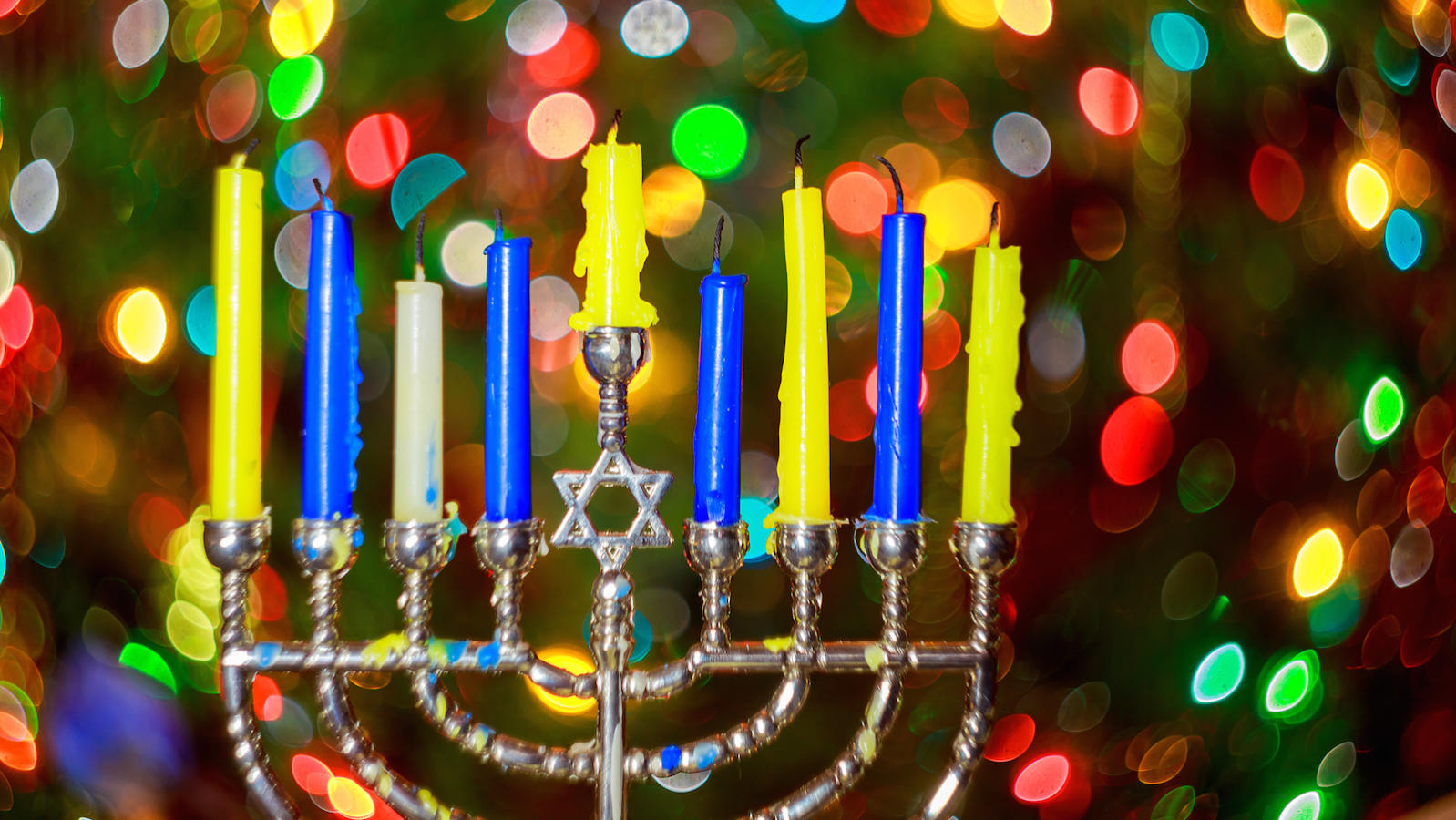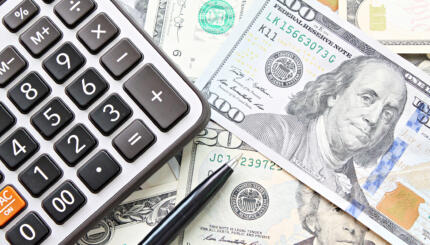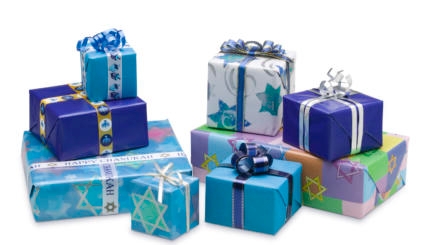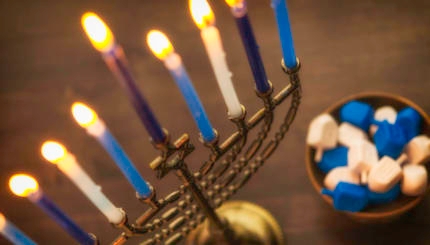Hanukkah, the Festival of Lights, celebrates the victory, in 164 BCE of armed Jewish rebels led by Judah the Maccabee over the army of the Syrian despot Antiochus IV. Against all odds, the courageous, resourceful, and badly outnumbered Jewish freedom fighters, David-like, slew the Syrian Goliath. Since that day, Jews around the world have marked Hanukkah as a “minor” holiday, not an observance commanded by Scripture but one that is nonetheless traditional.
Hanukkah has allowed Jews who were oppressed or under pressure to assimilate to identify a golden age in which militant, assertive Jews maintained their religious freedom and independence. Lighting candles, playing cards, and gambling with dreidels recall the prowess of the Maccabees and the miracle of the oil that burned for eight days, a sign that Jews are indeed God’s chosen people.
Proximity to Christmas
For the millions of Jewish immigrants who came to America at the end of the 19th and beginning of the 20th centuries, Hanukkah in the New World took on new, ambiguous and conflicted meanings. Hanukkah’s proximity on the calendar to Christmas posed particular challenges. By the 1890s, Christmas was firmly established as America’s premiere season for gift giving. For many Americans of all faiths, consumerism and general feelings of “good cheer” supplemented, if not replaced, the religious basis for Christmas. The holiday was rapidly becoming a national, rather than purely Christian, tradition.
For Jewish immigrants feeling pressure to shed their European ways, exchanging gifts with neighbors at Christmastime signaled their adaptation to their new home. In 1904, the Forward quoted Jewish Christmas shoppers who, when challenged, asked (in Yiddish), “Who says we haven’t Americanized?” The paper observed, “The purchase of Christmas gifts is one of the first things that proves one is no longer a greenhorn.”
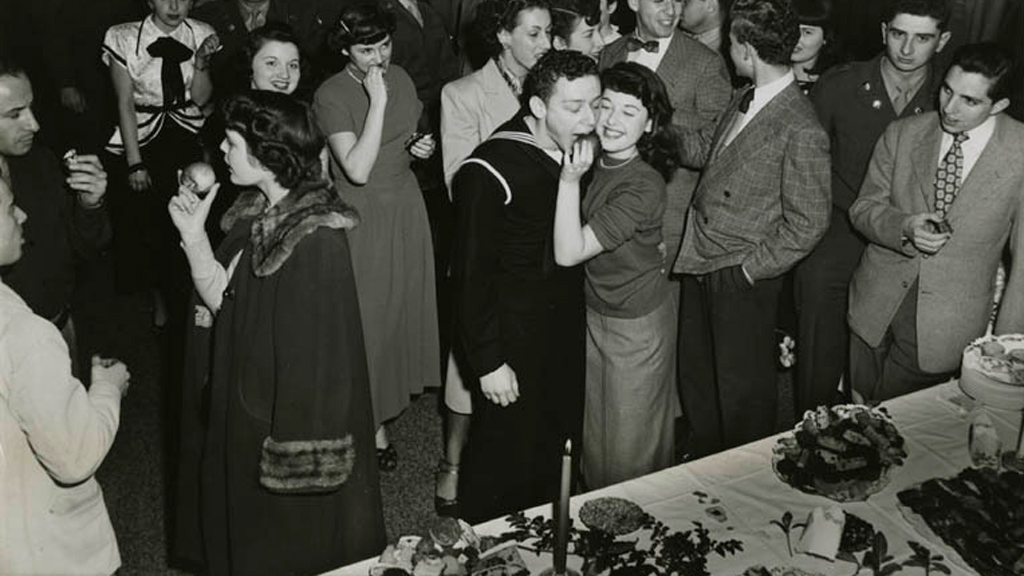
As historian Jenna W. Joselit notes, some Jewish leaders criticized the tendency of immigrant Jews to accept Christmas as an American consumer ritual. Writing in The Menorah in 1890, Rabbi Kaufman Kohler asked, “How can the Jew, without losing self-respect, partake in the joy and festive mirth of Christmas? Can he without self-surrender, without entailing insult and disgrace upon his faith and race, plant the Christmas tree in his household?”
Yet, Rabbi Kohler admitted, Hanukkah as then celebrated by American Jewry could not hold a candle (so to speak) to Christmas. Kohler said of the comparison, “How humble and insignificant does one appear by the side of the other” and suggested that Hanukkah needed more pizzazz if it was to compete with Christmas.
Jewish homemaking advisor Esther Jane Ruskay lamented in 1902 that Christmas’s focus on family celebrations, gift giving, decorations, and Santa Claus “gives a zest to life that all the Hanukkah hymns, backed by all the Sunday-school teaching and half-hearted ministerial [rabbinic] chiding, must forever fail to give.”
Hanukkah Finds Its Footing

Joselit notes that it was not until the late 1920s, when Jewish immigration to America was effectively ended, that Hanukkah “began to come into its own as a Jewish domestic occasion and an exercise in consumption.” Merchandisers to Jews began advertising their wares as ideal Hanukkah gifts. Der Tog carried an ad in Yiddish for Hudson automobiles, which were proclaimed “A Hanukkah Present for the Entire Family–The Greatest Bargain (metsiah) in the World.”
Colgate promoted toiletries as Hanukkah gifts and food purveyors such as Loft’s and Barton’s candies marketed chocolates wrapped in gold foil to simulate Hanukkah gelt [money]. Aunt Jemima flour proclaimed itself “the best flour for latkes,” and the Hadassah Newsletter advised that “mah-jongg sets make appreciated Hanukkah gifts.”
With the creation of the State of Israel in 1948, Hanukkah took on a new — or rather, renewed — meaning. In the aftermath of the Holocaust, the valor and success of Israeli military forces helped rebuild the image of the Jew as fighter. Zionists proudly identified the Haganah and Irgun [pre-statehood Zionist militias] as Maccabean descendants. Adapting the image of the martial Jew to its Hanukkah product line, Loft’s Chocolate Company issued a board game called “Valor Against Oppression” that featured General Moshe Dayan. Not to be outdone, Barton’s produced what Joselit calls “an Israelized version of Monopoly whose board featured a map of Israel, miniature Israeli flags, [and] menorahs.”
Despite the shift in the meaning of Hanukkah in light of Israeli military success, the holiday remains ambivalent for many American Jews. For younger Jewish children, December can still be a difficult month as they come to terms with the omnipresent lures of Santa Claus. Yet, Hanukkah seems to grow in popularity as the observance of traditional Jewish ritual becomes more widespread and intense.
In 1951, a California Jewish woman offered advice that, while acknowledging the parallels between Hanukkah and Christmas, bridges the worlds of Jewish particularism and American civic celebration: “Let this be our guiding principle: Keeping within the framework of our own tradition, using a color scheme of blue and silver and yellow and gold, let us adorn our homes inside and out as beautifully as we can for Hanukkah, enlarging upon the old-time Feast of Lights.”
Reprinted with permission of the American Jewish Historical Society from “Chapters in American History.”
Explore Hanukkah’s history, global traditions, food and more with My Jewish Learning’s “All About Hanukkah” email series. Sign up to take a journey through Hanukkah and go deeper into the Festival of Lights.
Hanukkah
Pronounced: KHAH-nuh-kah, also ha-new-KAH, an eight-day festival commemorating the Maccabees’ victory over the Greeks and subsequent rededication of the temple. Falls in the Hebrew month of Kislev, which usually corresponds with December.
menorah
Pronounced: muh-NOHR-uh, Origin: Hebrew, a lamp or candelabra, often used to refer to the Hanukkah menorah, or Hanukkiah.
Moshe
Pronounced: moe-SHEH, Origin: Hebrew, Moses, whom God chooses to lead the Jews out of Egypt.
